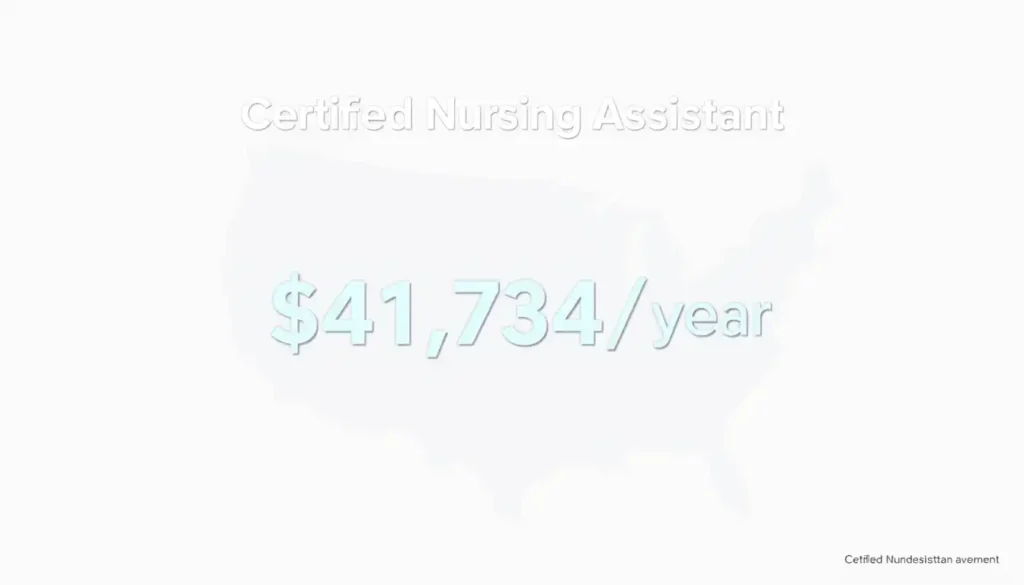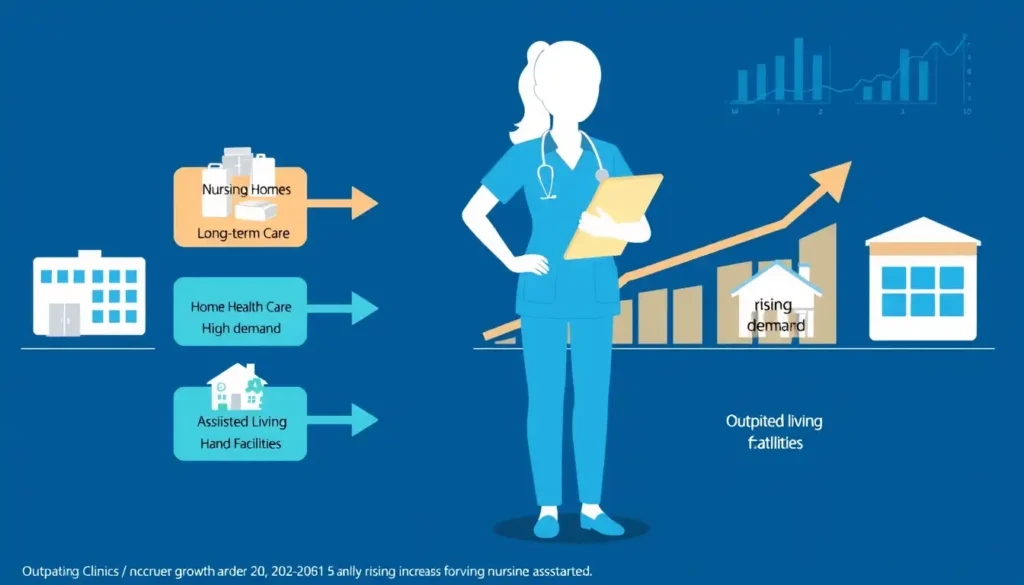CNA Jobs: A Complete Guide for Beginners
The healthcare field is very honorable and becoming a Certified Nursing Assistant (CNA) is one of the easiest and most fulfilling career options. Whether you’re new to the healthcare field or looking to change careers a CNA job is a great way to start.
This guide will provide you with all the information you need about a CNA career from understanding the role to finding a job. CNAs play an important role in healthcare settings. They work directly with patients and handle their basic care and support under licensed nurses.
The healthcare industry is growing and so are people’s ages so the demand for CNAs is increasing every day. According to the Bureau of Labor Statistics nursing assistant jobs will increase by a massive 4% between 2023 and 2033. There will be approx 216,200 new job openings each year.
What is a Certified Nursing Assistant (CNA)?
A Certified Nursing Assistant (CNA) is a trained healthcare worker who provides basic care and assistance to patients such as in a hospital or old age home. A CNA usually works under a (RN)registered nurse or (LPN)licensed practical nurse so that patients can get good care and help in their daily life. CNAs are called by slightly different names in different states.
For example: in Ohio they are called (STNAs) State Tested Nursing Assistant in New Hampshire and Vermont they are called (LNA) Licensed Nursing Assistant and in Kentucky they are called (SRNA) State Registered Nursing Assistant.

But whatever the name, the work is almost the same. CNAs handle almost 80% of the direct care of patients, so they are very important to the healthcare team. Their work is not limited to just physical care, they also provide emotional support to patients. This job requires compassion, patience, and good communication skills because you work with people who are in pain, or sometimes even afraid or confused.
Core Responsibilities of CNAs
It’s important to understand what a CNA(Certified Nursing Assistant) does.
Below is a table which describes what CNAs do daily in different hospitals or in care centers.
| Category | Responsibilities |
|---|---|
| Personal Care | Bathing, dressing, grooming, toileting assistance, feeding support |
| Medical Support | Taking vital signs, monitoring patient condition, reporting changes to nurses |
| Mobility Assistance | Helping patients walk, transferring from bed to wheelchair, repositioning |
| Documentation | Recording patient information, updating medical records, maintaining care logs |
| Environmental Care | Cleaning patient rooms, changing bed linens, stocking supplies |
| Communication | Answering patient calls, relaying information to healthcare team, providing emotional support |
The CNA job can vary slightly depending on location or patient type and state rules. But their main job remains the same caring for the patients and helping them in their daily lives with love.
CNAs also perform some basic medical tasks such as checking blood pressure, taking body temperature, and checking the pulse. They help patients who cannot walk or who have difficulty moving, such as getting them from the bed to the chair, or changing positions, so that they do not get bed sores.
Personal care is also an important part of the CNA’s job, such as helping patients bathe, put on clothes, and maintain their appearance (such as doing hair, cleaning face, etc.).

The CNA also has to maintain proper records. It is important to write down how the patient was cared for throughout the day if there is any change in their condition if they were given medication (where allowed). This information is very important for doctors, nurses so that they can provide proper treatment and track the progress of the patient.
CNA Training and Certification Requirements
To become a CNA(Certified Nursing Assistant) you must complete a state approved training program and then take a certification exam. The training process is relatively simple compared to other healthcare careers so this career is also ideal for people who want to start working quickly.
Training Program Duration and Structure
CNA training programs usually last 7 to 10 weeks but the length of time can vary by state and institute. Federal government rules require at least 150 hours of training, which includes both classroom study and practical (hands on work). Some states provide more training than this minimum so that you can be better prepared.
The training covers some important topics like:
- Basic nursing skills – such as patient care, cleaning, and infection control
- Anatomy and physiology – the structure of the human body and how it works
- Communication skills – the right way to communicate with the patient, their family, and the team
- Legal and ethical considerations – such as the patient’s rights, their privacy, and professional boundaries
- Emergency procedures – such as CPR, first aid, and handling emergency situations
You can get CNA training in community colleges, vocational schools, hospitals, or nursing homes.
Many employers also provide free training and pay salary during training, so people from any background can afford this course.
Certification Examination Process
After completing the training, one has to give a state exam, passing which gives certification.
This exam is divided into two parts, one written (or sometimes oral) and the other practical.
In the written test, your knowledge is checked such as nursing rules, patient care, etc. In the practical test, you have to show real skills such as taking vital signs, lifting the patient, and taking basic care of them.
In most states, you get a chance to give the exam 3 times, and this has to be completed within 24 months. If you do not pass the test in time, you will have to start training again.

After becoming a CNA, you will have to do some more continuing education each year to keep your certification active.
Continuing Education and Renewal Requirements
Federal law requires CNAs in most states to complete 12 hours of continuing education each year. Some states, such as California, require 24 hours each year, and Florida requires 24 hours completed in two years. Continuing education courses cover topics such as infection control, patient safety, communication skills, and special care techniques.
Most employers provide these courses for free, so maintaining certification is easy and you can gain new skills.
| State | Annual Hours Required | Renewal Period | Online Hours Allowed |
|---|---|---|---|
| California | 24 hours | 2 years | Up to 24 hours |
| Florida | 12 hours average | 2 years | Not specified |
| Texas | 12 hours | 2 years | Up to 12 hours |
| New York | 12 hours | 2 years | Varies by provider |
Work Environments for CNAs
CNAs work in a variety of healthcare locations and the experience varies from place to place. After knowing this you can decide which location is right for your interests and goals.
Hospitals
Hospitals are a common and popular place for CNAs to work. In a hospital you care for patients alongside nurses, doctors and other staff. You may find work in general wards, surgery floor, emergency or special departments (such as cancer or children’s ward).

There are some advantages of hospital jobs like higher salary, good benefits, and opportunity to see new medical cases. Here you get to learn new tools and systems, which are helpful for further career.
But one thing should be kept in mind that hospital jobs can be a bit tough too especially when you are new. Work is fast paced decisions have to be taken quickly and you should also know how to use technology like electronic health records and medical machines.
Nursing Homes and Long-Term Care Facilities
Nursing homes and long-term care places are mostly staffed by CNAs(Certified Nursing Assistants). Most elderly people live here who need help with daily chores, and that too for a long time. CNAs not only provide physical care to them, but also form an emotional connection with them such as understanding their pain and happiness, talking to their family, etc.
Working in nursing homes also has its benefits. CNAs usually have a fixed schedule and they get to know their patients well. This place is not as busy as a hospital, so CNAs get personal time with each patient. Many nursing homes also offer training for new CNAs and opportunities for advancement.
But there are some challenges as well, such as a CNA has to care for several patients at once, which can be a little tiring. There is a lot of personal care work, and sometimes there are patients who are very serious or ill. This work can sometimes seem difficult on an emotional level, but many people consider it a meaningful (valuable) job.
Home Health Care
Home health care has become the fastest growing field of healthcare today. In this, CNAs go to the homes of patients and help them like feeding, cleaning, giving medicines, etc. CNAs working here get more freedom and form a strong connection with each patient.
The advantage of working like this is that you can work in flexible time, and patients get help in living independently in their own homes. This work is a little less physically tiring compared to hospitals or nursing homes, and CNAs can work in their own way.

But there are challenges as well like you need your own reliable car and have to work alone without any direct supervision of the boss. Every home is different, so one has to adjust with every patient and their family. Sometimes there can be cultural differences as well.
Other Healthcare Settings
CNAs work not only in nursing homes or home care, but also in many other places, such as:
- Rehabilitation centers – where patients are recovering after surgery or injury
- Assisted living facilities – where people want a little help but are mostly independent
- Hospice care – where patients in the final stage of serious illness or disease are given comfort care
- Adult day care centers – where the elderly or disabled people come for daytime care
- Psychiatric facilities – where patients with mental health problems are treated
The work of each place is different. You can choose the kind of environment you like to work in based on your interest.
CNA Salary and Compensation
If you want to become a CNA it is important to get information about salary so that you can make an informed decision. CNA salary depends on many things like which state you are in how much experience you have what type of hospital or care center you work in etc.
National Salary Overview
According to 2024 data, the average salary of a CNA in America is $41,734 per year i.e approx $20 per hour. But this is an average number. In fact salaries vary from $16 to $27 per hour.
According to data from the Bureau of Labor Statistics the median salary of nursing assistants in May 2024 was $39,530. Each level of experience has a different range.

| Percentile | Hourly Wage | Annual Salary |
|---|---|---|
| 10th | $14.44 | $30,020 |
| 25th | $16.82 | $34,990 |
| 50th (Median) | $18.36 | $38,200 |
| 75th | $21.41 | $44,540 |
| 90th | $23.45 | $48,780 |
State by State Salary Variations
The state you are in has a big impact on CNA salaries. Where cost of living is higher, salaries are also higher so that people can get attracted.
| State | Median Annual Salary | Hourly Range |
|---|---|---|
| Alaska | $45,840 | $19.80 – $28.75 |
| New York | $47,390 | $18.02 – $28.48 |
| California | $46,420 | $18.86 – $28.62 |
| Massachusetts | $45,410 | $18.45 – $27.09 |
| Hawaii | $44,830 | $17.12 – $25.55 |
| Louisiana | $30,240 | $12.82 – $18.13 |
| Mississippi | $30,460 | $11.33 – $18.65 |
| Arkansas | $31,990 | $13.63 – $18.96 |
The salary range of some selected states is given below. Generally, salaries are higher in big cities than in rural areas because both demand and expenses are high there.
Industry-Specific Compensation
A CNA works makes a difference in salary. Below is a table showing the average salary for each location.
| Industry | Average Annual Salary | Employment Level |
|---|---|---|
| Hospitals | $40,840 | 410,930 |
| Nursing Care Facilities | $38,730 | 458,590 |
| Home Health Care | $35,640 | 81,370 |
| Assisted Living | $37,660 | 146,190 |
| Employment Services | $45,460 | 59,480 |
Hospitals and staffing agencies (such as those that send people to different locations to work) usually pay the most. But places like home health care or assisted living may pay a little less but have a better work-life balance.
Benefits and Additional Compensation

Most CNA jobs offer some extra benefits apart from salary, such as:
- Health insurance – Covers medical, dental and eye check-up
- Retirement plans – Like 401(k) saving plans or pension
- Paid time off – Gets leave for vacation, illness or personal work
- Continuing education – Company pays for extra courses or training
- Shift differentials – If you work night or weekend shifts, you get extra money
- Performance bonuses – A different reward or hike for doing good work
People who are traveling CNAs or work through a staffing agency also get extra benefits, such as: Home rent allowance
Travel money is returned is
Bonus is given after completing the work
Career Advancement Opportunities
The best thing about CNA job is that you can grow in it. With a little extra training or experience, you can make your career strong whether you specialize in CNA role or go ahead and become a nurse.
Specialization Within CNA Practice
You can become an expert in any special field even though you are a CNA. It takes a little training, but the salary is also high. Some popular areas:
- Geriatric care – taking care of elderly people
- Pediatric care – working with children and young patients
- Rehabilitation nursing – helping patients after accident or surgery
- Memory care – caring for patients with dementia or Alzheimer’s
- Hospice care – comfort care for people who are in the last stage
For such special areas, separate training is required, but the salary can also be 10–15% higher.
Leadership and Management Roles

CNAs who gain experience (after 2–3 years) can move into slightly higher roles, such as:
- CNA Team Leader – Guiding other CNAs
- Preceptor – Training new CNAs
- Charge Nurse Assistant – Helping supervisors with admin work
- Patient Care Coordinator – Managing patients’ routine
- Quality Assurance Assistant – Checking the quality of work
These roles require a little extra training, but the salary also increases and the work becomes more interesting.
Advanced Nursing Education Pathways
Many CNAs use their experience as a stepping stone to advanced nursing careers. Common progression paths include:
CNA to Licensed Practical Nurse (LPN)
Further Study in Nursing Higher Education Options
Many CNAs plan to become nurses to advance their career. This is a natural next step.
The most common path is:
CNA to Registered Nurse (RN)
Becoming an RN means you move from CNA to a higher level. You can become an RN with an Associate Degree (ADN) or Bachelor’s Degree (BSN).
Many nursing colleges offer bridge programs where you can pursue your studies while working.
The difference in salary is also big:
The average salary of a CNA is $39,530/year
That of an RN is approx $86,070/year
So becoming an RN can double your earnings. That’s why it is a financially smart option.
Other Healthcare Career Paths
CNA experience can also be taken to other healthcare fields, such as:
- Patient Care Technician (PCT) – Small and technical work
- Medical Assistant – Support work in doctor clinics
- Phlebotomist – Taking blood samples and working in the lab
- Pharmacy Technician -Helping in making and giving medicines
- Physical Therapy Assistant – Making patients do exercises

All these careers are based on the basic patient care experience of a CNA and both the type of work and salary can be different.
Job Market Outlook and Growth Projections
The future of CNA jobs is strong. Its demand is going to increase in the coming time. Therefore, becoming a CNA is a safe career choice.
Employment Growth Statistics
According to the Bureau of Labor Statistics, 4% growth is expected between 2023 and 2033, which is average in nursing assistant jobs.
There will be approximately 216,200 CNA job openings each year. What is the reason for this growth?
- Aging population – Elderly people are aging as the baby boomer generation is retiring
- Chronic disease management – people who are long-term ill need care
- Healthcare accessibility – so hospital access is also increasing
- Cost-effective care – CNA work is affordable compared to higher-level nurses
Regional Growth Variations
CNA jobs are growing at different speeds in different places. Below is a table that estimates job growth for some states by 2030.
| State | Current Employment | Projected Growth Rate |
|---|---|---|
| California | 97,970 | 14% |
| New York | 81,440 | 14% |
| Texas | 75,690 | 12% |
| Florida | 84,520 | 11% |
| Pennsylvania | 71,880 | 10% |
Demand for CNAs is also growing rapidly in areas where older people live and the healthcare system is developing. States like Florida and Arizona where people live after retirement have the greatest need for CNAs.
Sector-Specific Growth Trends
Demand for CNAs is growing at different speeds in different healthcare sectors:
- Home health care – This is the fastest growing sector, it can grow up to 37% by 2030.
- Assisted living facilities -Old people now prefer places where they get the comfort of home.
- Hospitals – There is a little steady growth here, the focus is to give a good experience to the patient.
- Nursing homes – Despite some problems, there is a demand for CNA here.
- Rehabilitation centers – There is growth here due to increased focus on recovery and improving health.

Home health care is the fastest growing sector, because now people want treatment at their home, instead of going to the hospital.
Factors Driving Demand
There are some main reasons behind the increase in demand for CNA jobs:
Demographic Changes: People aged 65+ will be almost double from the year 2021 to 2030. Older people = more healthcare need.
Nursing Shortage: There is a shortage of nurses, so there is more reliance on CNAs. The work of CNAs has become more important now.
Healthcare Industry Expansion: The healthcare field is growing every year. There will be up to 13% growth in the next 10 years, which will bring new jobs for CNAs.
Policy Changes: Now the government and hospitals are focusing on preventive care and patient happiness so the demand for CNAs is increasing.
Finding CNA Jobs: Strategies and Resources
To get a CNA job, you need to understand the job market search in the right place and present yourself well. These tips will help you:
Job Search Strategies
Online Job Boards: CNA jobs are available on Indeed, ZipRecruiter, and LinkedIn. Apply filters to find jobs and set job alerts.
Healthcare-Specific Websites: Websites: Such as HealthcareJobsite.com or NurseJobsOnline.com these are only for healthcare jobs.
Direct Employer Applications: Keep checking the websites of hospitals and clinics in your area. Sometimes jobs are posted first on their sites.
Staffing Agencies: Agencies like IntelyCare, Aya Healthcare help you find part-time or full-time jobs. They also provide training and benefits.
Networking and Professional Connections
Professional Organizations: Join groups like NAHCA, here you get jobs and updates.
Alumni Networks: Stay in touch with friends and teachers from training, they can recommend you jobs.
Current Employer Relationships: If you have already worked somewhere, then maintain good connections with your bosses and coworkers.
Community Involvement: Volunteer in local health camps and events, you can get a job from here too.

Interview Preparation and Success Tips
Research the Employer: Before the interview, read a little about the hospital or clinic, what is their mission, what type of patients are there.
Practice Common Interview Questions: Such as:
- What is the reason for becoming a CNA?
- What will you do if the patient gets angry?
- What work have you done in patient care?
- What would you like to learn next?
Highlight Relevant Experience: Even if you do not have any experience tell us about a job or situation where you have helped someone.
Prepare Questions: You can also ask questions in the interview such as:
- Will I get training?
- What will be the timings?
- Is there a chance of growth?
Resume and Application Tips
Professional Summary: In the beginning, write a short intro that you are CNA certified, what is your experience, and what are your strengths.
Skills Section: Technical: Patient upliftment, taking vital signs, making records Soft Skills: Communication, patience, team work
Experience Description: Use simple action words like “helped”, “assisted”, “took care of…” Such as: “Took care of 15 patients daily” “Maintained 98% patient satisfaction”
Education and Certifications: Mention CNA certificate, CPR training clearly. Write their validity as well.
References: Make a list of people who can speak well about your work, definitely write their name, number and relation.
Benefits of Pursuing a CNA Career

Becoming a CNA not only gives you a job, you also get satisfaction because you have a positive impact on the lives of real people.
Personal Fulfillment and Purpose
Working as a CNA gives satisfaction from the heart. When you help a patient, make their life a little better, then their “thank you” is the biggest reward. Sometimes you become like family to them. You maintain their dignity and increase their confidence.
CNA is not just an assistant’s role, you are an important part of the healthcare team that gives full care to the patient.
Job Security and Stability
The healthcare industry is a very stable field and CNA(Certified Nursing Assistant) jobs have strong job security. According to the Bureau of Labor Statistics CNA jobs are always in demand whether the economy is good or bad.
There are some main reasons behind securing a job:
- Essential service – There is always a need for healthcare so a CNA job never stops
- Aging population – The elderly population is increasing due to which the demand for healthcare is also increasing
- High turnover – Many people keep coming and going in this field, so there is always scope for new people
- Geographic flexibility – CNA skills are useful in different states and hospitals
Financial Benefits and Growth Potential
The salary of a CNA is moderate in the beginning but as experience increases income can also increase especially if you start working in a special area.
Some financial benefits are:
- Immediate earning potential – You can start working as soon as you complete training and start earning income
- Overtime opportunities – Hospitals pay extra for extra shifts
- Shift differentials – You get extra pay for working night or weekend shifts
- Benefits packages – Health insurance, retirement plans and paid leave
- Career advancement – You can earn more income with a promotion or further education
Flexible Work Options

CNA jobs are flexible so they are perfect for students, moms or part time workers. Flexible options:
- Shift variety – you can choose from morning evening or night shifts
- Part-time and full-time – you can choose to work according to your schedule
- PRN (as needed) – work whenever required, completely flexible
- Travel opportunities – you can gain experience by working in different places
- Multiple employers – you can increase both income and experience by working in more than one hospital
This flexibility makes CNA careers particularly attractive to students, parents and others who need to balance work with other responsibilities.
Professional Development and Learning
While working as a CNA, you can always learn something new. The healthcare industry changes fast, so new skills and knowledge keep getting acquired.
Learning Learning options include:
- Continuing education – Short courses which improve your skills and knowledge
- Specialized training – Chance to learn how to work with specific types of patients (such as dementia or disabilities)
- Cross-training – Experience working in different departments such as emergency or surgery
- Leadership development – Training programs to become a supervisor
- Formal education support – Many employers also help with fees for further nursing school
Building a Healthcare Career Foundation
Working as a CNA builds a strong base for a healthcare career. You get experience of real patient care, which is helpful in becoming a nurse or doctor in the future.
Many successful nurses and healthcare professionals have started their careers with CNA. This work helps you understand the system, deal with people, and build confidence in the medical field.
Essential Skills and Qualities for CNA Success
There are certain technical skills and personal qualities required to become a CNA. It is important to understand these so that you can check your readiness.
Technical Skills Requirements

Patient Care Skills: Helping patients in daily life such as feeding, lifting, cleaning, checking vital signs, and providing comfort all come under training.
Communication Skills: Talking to patients politely and clearly and their families.
Documentation Skills: Writing patient records correctly on time and clearly.
Observation Skills: Noticing change’s in the patient’s condition immediately.
Technology Proficiency: Being comfortable using computer and monitoring equipment.
Personal Qualities for Success
Compassion and Empathy: Working with patience understanding the feelings of patients.
Patience: Not every patient is easy working with them with patience is a must.
Physical Stamina: Long duty lifting and moving the patient requires physical strength.
Emotional Resilience: Sometimes emotional situations occur one has to remain strong.
Reliability: Being on duty on time and doing one’s work correctly.
Professional Attributes
Professionalism: Respectful behavior with patients while following rules and maintaining proper dress code.
Teamwork: Doctors and nurses will work together. Everyone together takes care of the patient like a team.
Adaptability: When the situation or condition changes, then adjusting quickly with it. Accepting new work or changes easily.
Attention to Detail: Taking care of small things like giving medicine to the patient on time seeing to their cleanliness and maintaining hygiene.
Cultural Sensitivity: Treating people of different background (like culture, language) with respect. Behaving equally with everyone.
Skills Development Table
| Skill Category | Specific Skills | Development Methods |
|---|---|---|
| Technical | Vital signs, Patient positioning, Infection control | Training programs, Hands-on practice, Continuing education |
| Communication | Active listening, Report writing, Family interaction | Role-playing, Workshops, Mentoring |
| Physical | Lifting techniques, Endurance, Dexterity | Proper training, Exercise, Ergonomic practices |
| Emotional | Stress management, Coping strategies, Empathy | Support groups, Counseling, Self-care practices |
| Professional | Time management, Teamwork, Ethics | Workplace experience, Professional development, Leadership training |
Conclusion
To become a Certified Nursing Assistant(CNA) is a good way to start working in the healthcare field. In this job you get personal happiness chances of career growth and money is also good.
The training is not too long the job is secure and you can help people in real life that is why people like to become a CNA.
Nowadays the healthcare field is growing fast people are growing and medical help is reaching more people. For this reason the demand for CNA will remain in the future as well. Whether you’re just starting a job or looking to change careers working as a CNA gives you a strong base from which to grow further in healthcare.
To become a CNA you need dedication, compassion, and desire to learn new things. Sometimes the work is tough but the peace and respect you get from helping patients makes this career valuable especially for those who wholeheartedly want to help others.
External Links and Sources
- Bureau of Labor Statistics – Nursing Assistants
- Indeed – CNA Jobs
- National Association of Health Care Assistants
- American Red Cross CNA Training
- ShiftKey CNA Resources
- IntelyCare Career Advice
- AllNursingSchools.com CNA Guide
- Nurse.org CNA Information
- CNA Classes Near Me
- AccreditedSchoolsOnline CNA Programs
- Study.com CNA Certification
- WGU CNA Career Guide
- Vitali Partners CNA Resources
- Health Tech Academy
- CareRev CNA Work Environments
FAQ’s
What is the highest paying CNA job ?
Travel CNAs earn the most money, as they have to work in different places and the demand is also high. Their pay can be around $20–$30 per hour or more.
What jobs can I get with a CNA cert ?
After you get a CNA certificate you can work in hospitals, nursing homes, assisted living homes and home health care services.
What other jobs can a certified nursing assistant do ?
After becoming a CNA, you can shift to roles such as medical assistant, patient care technician, and phlebotomist (who takes blood samples).
What pays better than a CNA ?
LPNs(Licensed Practical Nurses) and RNs(Registered Nurses) earn much higher salaries than CNAs.
What state pays CNAs the best ?
CNA salaries are highest in states like Alaska, California, and New York.


